
Your Ultimate Guide to Iceland in July
Jump to chapter
Iceland in July is a mesmerizing spectacle of Mother Nature’s grandeur, twinkling under the constant glow of the midnight sun. Imagine a land of lush greenery, cascading waterfalls, and a bubbling hot spring, alive with the songs of thousands of puffins.
Picture yourself exploring this magical landscape, bathed in almost 24 hours of daylight, offering ample time to soak in all its splendor. Ready for the adventure? Let’s embark on this journey to experience Iceland’s summer wonders.
Key Takeaways
- Experience the beauty of Iceland’s luscious landscapes and abundant wildlife under 24 hours of daylight.
- Enjoy captivating outdoor activities, hot springs, festivals & events during summer in Iceland.
- Pack responsibly for a budget friendly trip with camping as an accommodation option to explore this unique destination!
Why Visit Iceland in July?
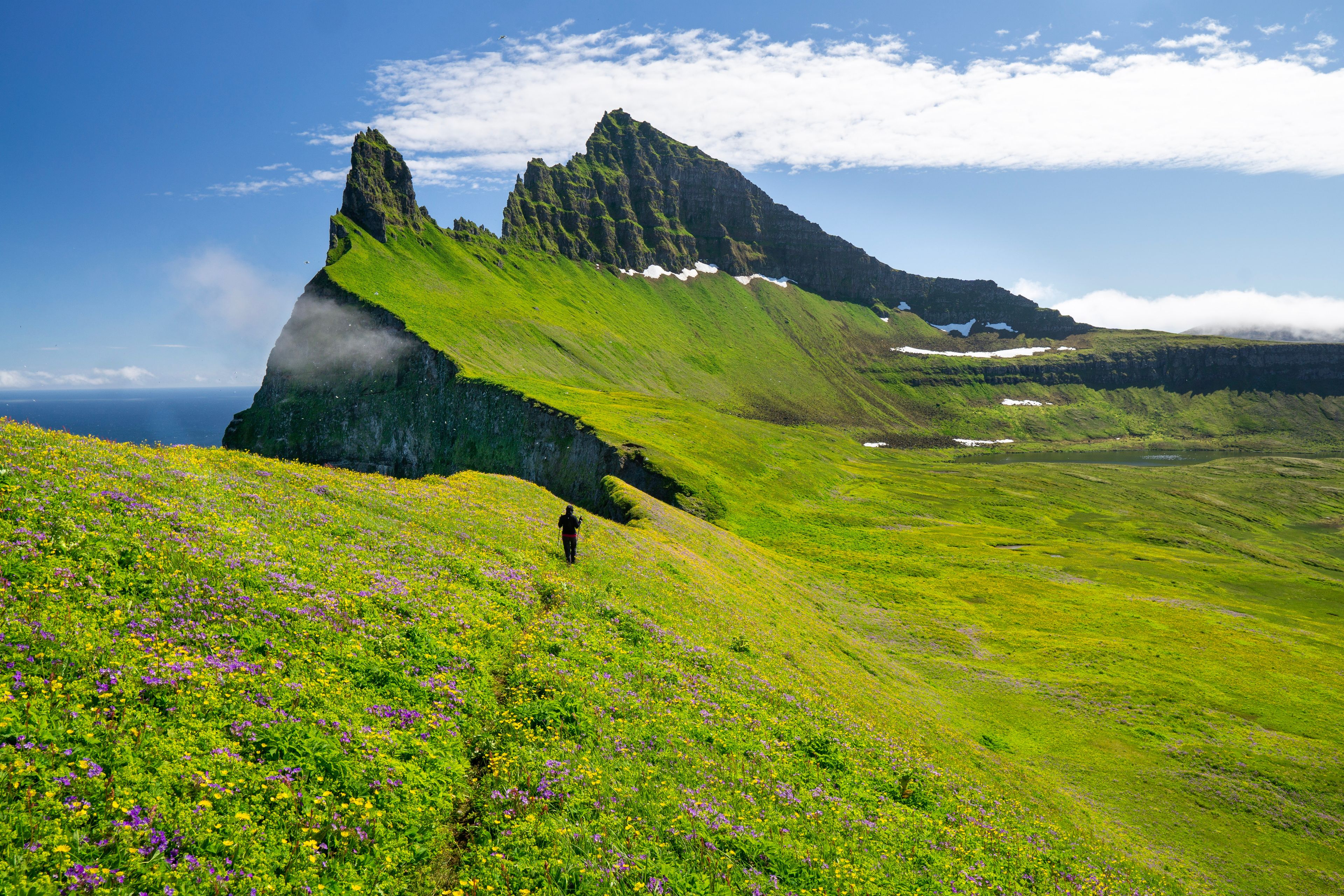
Iceland, with its long daylight hours and vibrant landscapes, presents a unique summer season vacation opportunity. The stunning scenery of Iceland in July is captivating and the country hosts a variety of activities and events, including glacier hiking and local music festivals.
July is a great time to visit because:
- The landscapes are at their lushest, blanketed with wildflowers
- The wildlife is abundant, providing ample photo opportunities
- The views are breathtaking
- The extended daylight allow for more exploration
However, do bear in mind that the northern lights aren’t visible during this time due to the extended daylight hours.
Daylight Hours and Midnight Sun
The phenomenon of the Midnight Sun in Iceland, closely related to the summer solstice:
- Occurs in late June
- The sun barely sets below the horizon during this period
- Provides almost 24 hours of daylight
- Allows for enhanced sightseeing experiences
- Offers unique opportunities to witness Iceland’s natural wonders under the surreal glow.
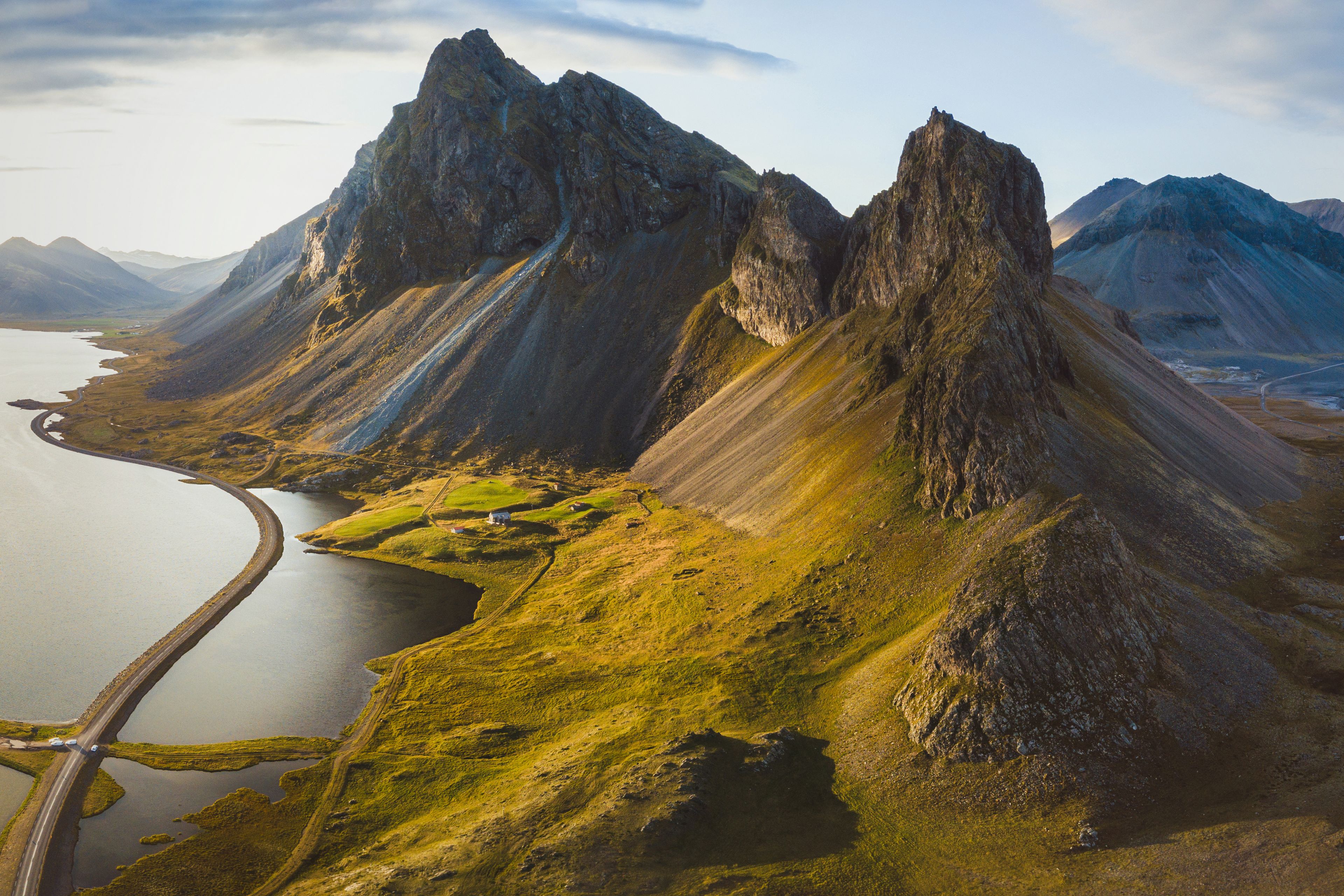
Imagine visiting popular sites like the Golden Circle or the Jökulsárlón Glacier Lagoon when the crowds have scattered, with the sun still lingering on the horizon.
Sightseeing during the midnight sun lets you avoid the peak tourist hours and make the most of the extended daylight hours for more exploration opportunities.
| Months | Average Daylight Hour |
| April | 15,2 |
| May | 18,5 |
| June | 21,3 (Few days with 24 hours) |
| July | 19,9 |
| August | 16,5 |
| September | 13,1 |
Weather and Temperature
Contrary to the typical image of sweltering heat associated with summer, summers in Iceland are refreshingly mild. The temperature in July usually hover between 9-14°C (50-60°F). Such a pleasant climate is perfect for exploring the south coast or setting off on a self-drive tour along the Ring Road.
However, Icelandic weather is as unpredictable as it is beautiful. In July, you can expect mild weather with:
- Occasional rain showers complemented by sunny periods
- Sudden weather changes
- Warm sunshine
- Light drizzle
So, it’s always a good idea to pack a raincoat and be prepared for sudden weather changes, especially when exploring the beautiful landscapes of east Iceland.
| Month | Average high | Average low |
| June to August | 13°C / 54°F | 8°C / 46°F |
| September to November | 7°C / 44°F | 4°C / 39°F |
| December to February | 3°C / 37°F | -5°C / 23°F |
| March to May | 5°C / 41°F | 0°C / 32°F |
Activities and Attractions
Iceland transforms into an outdoor enthusiast’s paradise in July. The nearly 24-hour daylight offers sufficient time for thrilling outdoor adventures, intimate wildlife encounters, and relaxing dips in a soothing hot spring.
A more detailed examination of these activities ensues in the subsequent subsections.

Photo of Landmannalaugar in Iceland
Hiking Adventures
July is the perfect month for hiking in Iceland, with its myriad hiking trails and guided tours open for exploration. The renowned Laugavegur trail and the Fimmvorduhals trail are particularly popular among avid hikers.
These multi-day treks take you through diverse landscapes, including glaciers, volcanoes, and lava fields, offering an unmatched hiking experience.
Of course, safety is paramount when hiking in Iceland. Here are some important safety tips to keep in mind:
- Wear warm clothing and sturdy hiking boots
- Stay on marked trails
- Check the weather regularly
- Hike in a group if possible
- Register your travel plans if you’re planning to hike or camp in the highlands.
Wildlife Encounters
Iceland in July is synonymous with vibrant wildlife. Did you know that 60% of the world’s puffin population chooses to reside in Iceland during the summer? And puffins aren’t the only stars of the show.
Whale watching is a popular activity in July, offering the chance to spot various species, from Minke and humpback whales to the majestic blue whales.
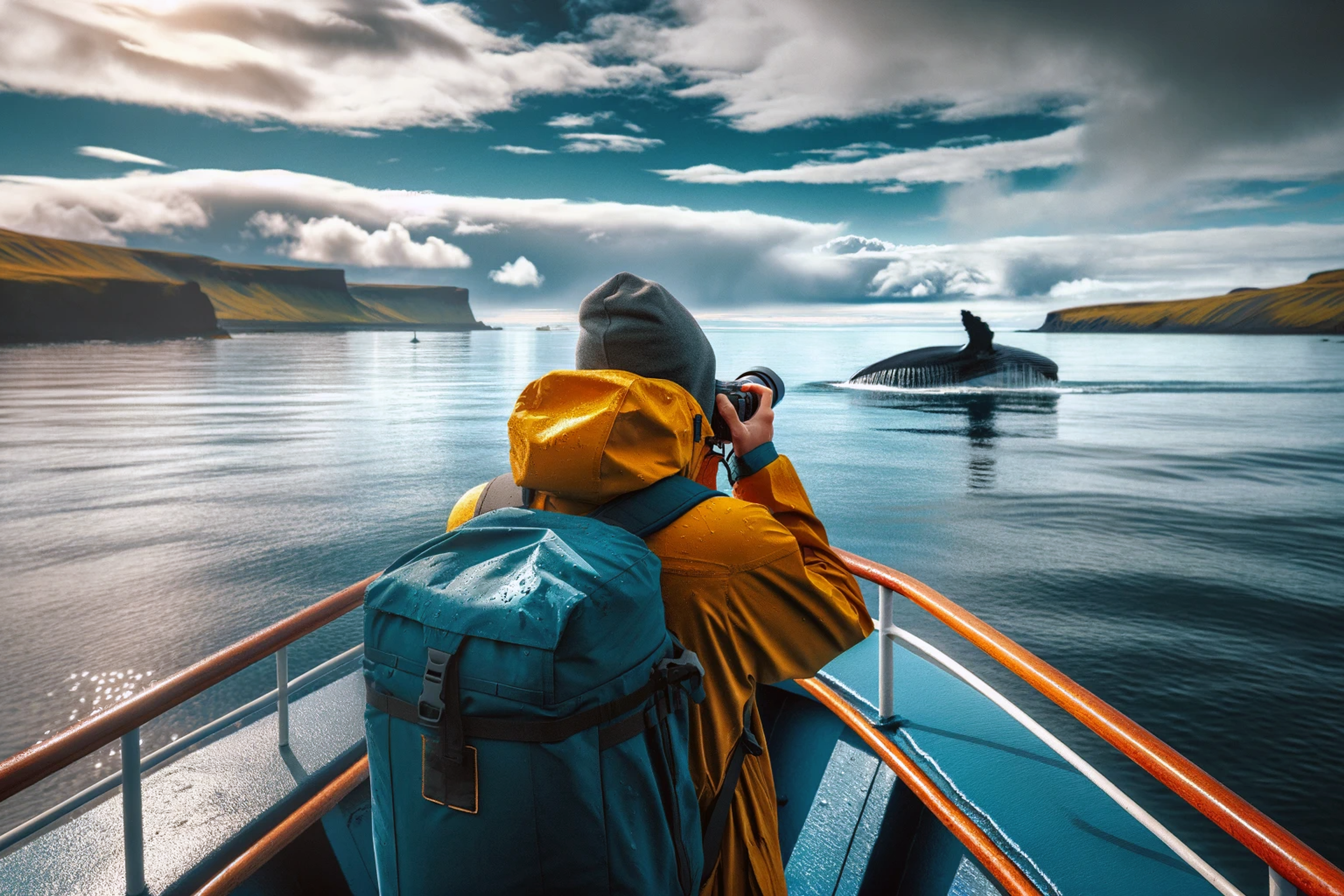
For the best whale watching experience, consider taking a tour from:
- Husavik in North Iceland, often referred to as the whale watching capital of Iceland
- The coasts of the Westfjords
- The coasts of the East Fjords
- The Snaefellsnes peninsula
You could spot these magnificent creatures from any of these snow covered mountains locations.
Soaking in Natural Hot Springs
After a day of hiking or wildlife watching, there’s nothing better than soaking in Iceland’s natural hot springs. These geothermal pools, like the famous Blue Lagoon and Myvatn Nature Baths, are perfect for unwinding and rejuvenating your senses.
In addition to the popular hot springs, Iceland is dotted with lesser-known natural hot springs spread across the country. July is the perfect time to discover these hidden gems, with the warm weather adding to the overall enjoyment of the experience.
Cultural Experiences: Festivals and Events
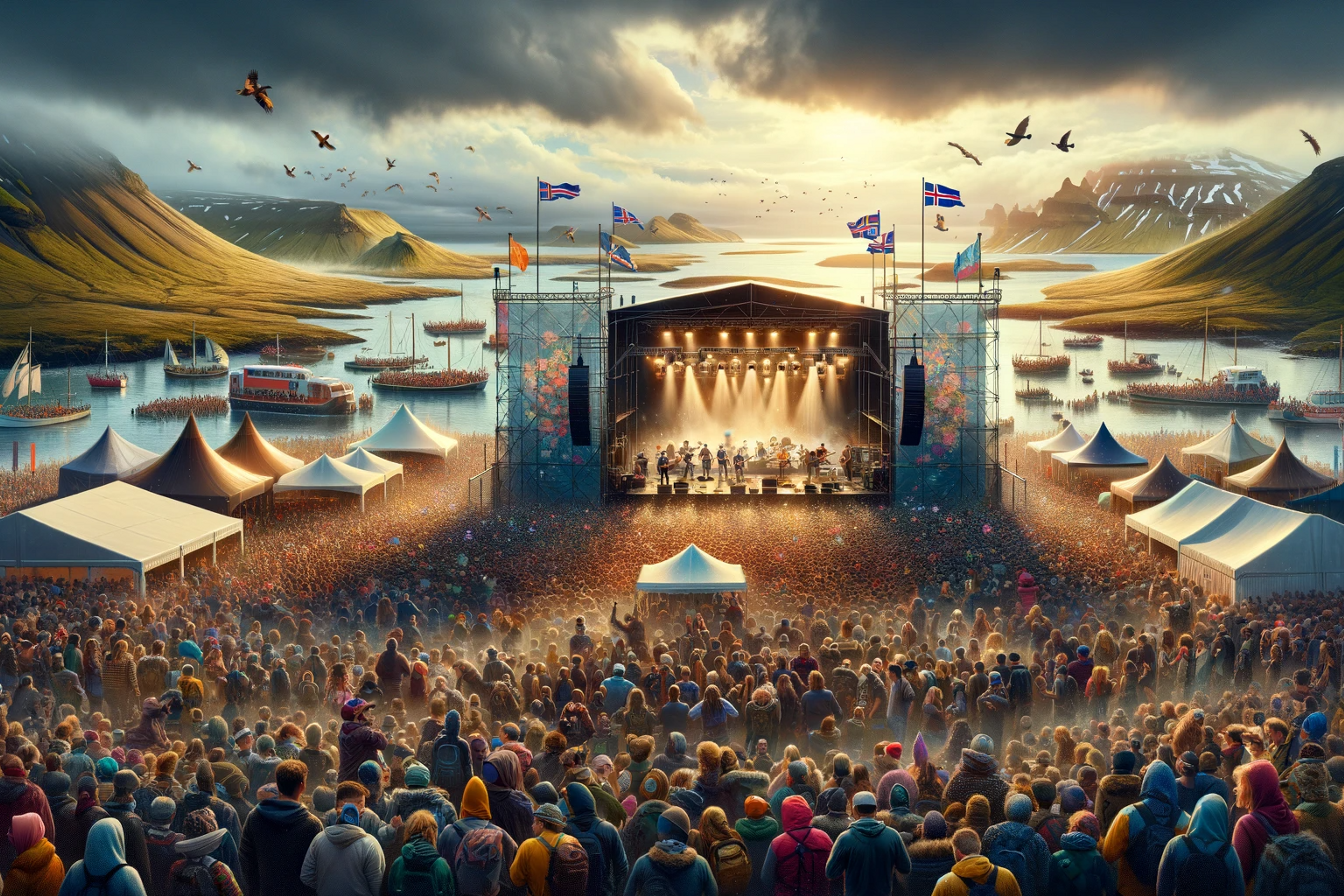
Immerse yourself in local culture and enjoy the vibrant festivals Iceland has to offer in July. The year 2025 is packed with various music, art, and cultural festivals, showcasing the country’s lively cultural scene. Here's a list of the festivals and their dates:
From 5th to 7th July:
- The Beer Festival at Hólar: A festival where beer producers for the Icelandic market meet and present their products and innovations in the beer market.
- Irish Days: A town festival in Akranes with a variety of entertainment.
- Bryggju Festival: Held in Stokkseyri, this festival features fireplaces and dock songs along with a varied family program.
- Home in Búðardalur: A town festival held every other year in Búðardalur.
- Everything in Bloom: A family and cultural festival in Hveragerði.
From 12th to 14th July:
- Eistnaflug: An annual music festival held at Neskaupstadur.
- Vestmannaeyja Volcano Festival: A town festival in the Westman Islands, celebrating the end of the eruption at Heimaey 1973.
- Kótelettan: A family and music festival held at Selfoss. It showcases the production of farmers in Iceland along with a varied entertainment program.
From 19th to 21st July:
- Húnavaka: A town festival held at Blönduós.
- LungA: An international arts festival for young people held in Seyðisfjörður. The festival includes art workshops, exhibitions, and amazing concerts.
From 26th to 28th July:
- Soapball: An unusual entertainment event in Olafsfjordur.
- Mærudagar: A town festival in Húsavík. The festival features a variety of activities including tivoli, foxynar, Barnafjörur on the Bryggjunn, Mærudagstóti, and much more.
- The Smelting: A true music party in Borgarfjörður east.
Road Trips and Driving Conditions
A road trip is a fantastic way to explore Iceland, offering the freedom to discover the country at your own pace. In July, the driving conditions in Iceland are excellent, with the warmer weather ensuring that most roads are open.
Whether you’re planning a leisurely drive along the south coast or an adventurous trek in a 4x4 vehicle through the highlands, July is the perfect time for a road trip.

Packing Tips and Essentials
Given Iceland’s unpredictable weather, packing for a July visit might present a bit of a challenge. It’s advisable to pack versatile items to cater to all possible scenarios. Layering is a sensible approach.
Make sure to pack thermal base layers, long-sleeved shirts, a fleece, leggings, and jeans to stay warm during your trip. These items will provide the necessary insulation against the cold weather.
Add a waterproof shell for wind and rain protection and a rain jacket and hiking pants for outdoor adventures.
In addition to clothing, remember to pack:
- An eye mask for the long daylight hours
- Swimwear for the hot springs
- Sunglasses and sunscreen for sun protection
- A good pair of hiking boots if you’re planning on exploring Iceland’s beautiful trails.
Accommodation and Budget Considerations
One of the significant considerations when planning your Iceland trip is accommodation. For budget travellers, visiting Iceland in July offers a popular and affordable option – camping.
Icelandic campsites are wonderfully situated in some of the most scenic areas, providing a unique way to experience the beautiful Icelandic scenery.
If you're interested in camping, we highly recommend our sister company Go Campers Iceland for your camper needs. They offer a variety of options to suit different travel styles and budgets.

The cost of camping in Iceland during July is typically affordable, ranging from about 1000 ISK to 2500 ISK per person per night. This, along with the convenience and flexibility of a camper from Go Campers Iceland, makes it a cost-effective and budget-friendly choice for accommodation during your trip.
Tips for Responsible Travel
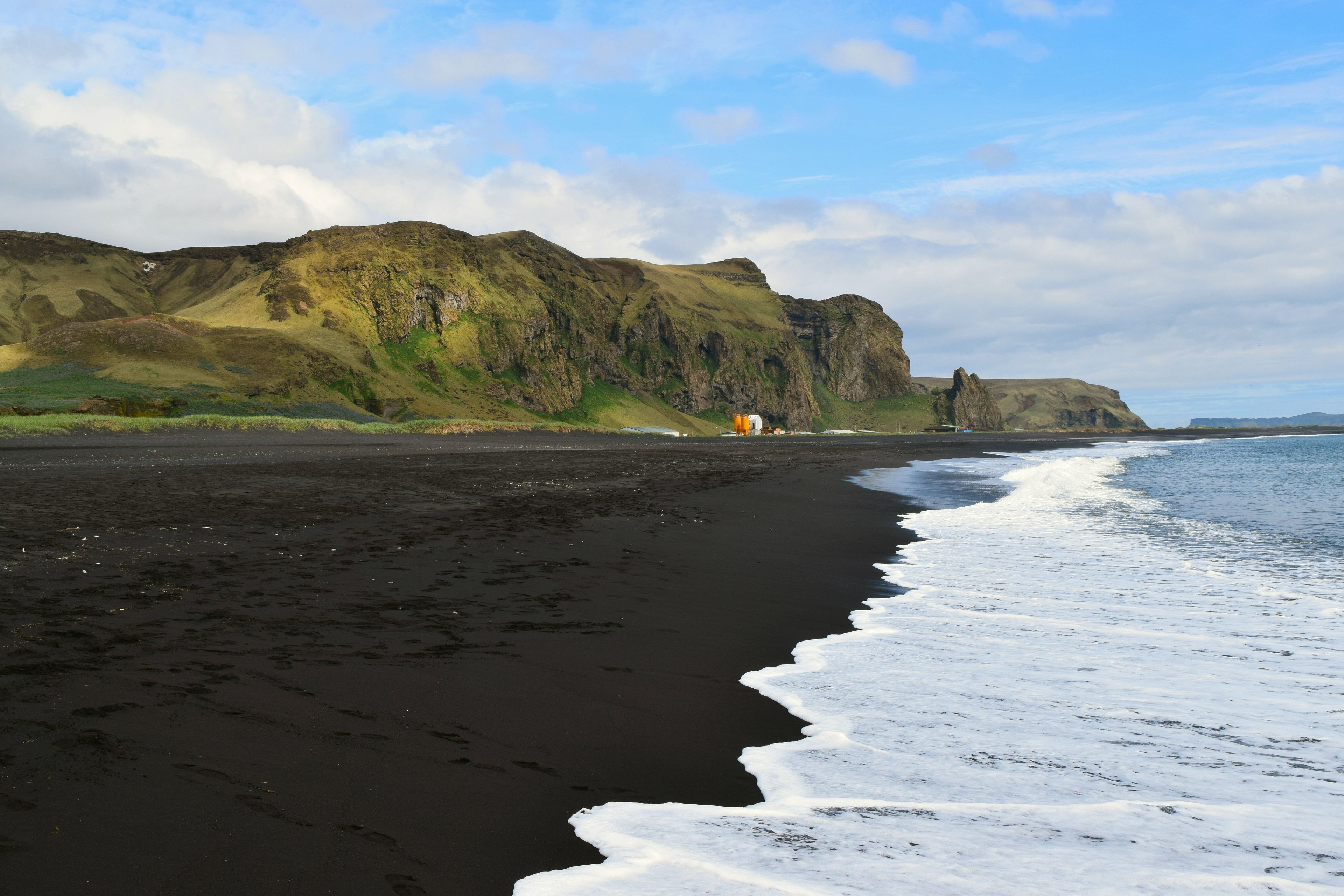
The essence of responsible travel lies in ensuring our visits don’t negatively affect the places we visit. In the context of Iceland, this involves adherence to designated trails and campsites, minimizing or offsetting your carbon footprint, and showing respect towards local culture.
When you travel responsibly, you’re not only preserving the natural beauty of Iceland for future generations but also contributing positively to the local economy.
This can be achieved by choosing sustainable accommodations and activities, enjoying local food, and buying locally made products. And remember, always leave nature as you found it.
Summary
In conclusion, a trip to Iceland in July offers a unique blend of natural wonders, vibrant wildlife, cultural experiences, and outdoor adventures.
Whether you’re captivated by the spectacle of the 24 hour daylight, drawn to the allure of a hot spring, or excited by the call of the wild, Iceland promises an unforgettable summer vacation.
So, pack your bags, prepare for an adventure, and embrace the enchanting beauty of the Icelandic summer.
Frequently Asked Questions
Latest Blog Posts
 Highlands
HighlandsGjáin Valley in Iceland: A Hidden Treasure in the Highlands
Iceland has tons of amazing landscapes, but Gjáin Valley truly stands out. This green paradise tucked in the Icelandic Highlands feels magical for anyone willing to step off the tourist path. Planning a trip to Iceland? Here's what you should know about this special spot.
 Canyons
CanyonsMúlagljúfur Canyon: A Secret in South Iceland Waiting to Be Explored
Iceland is a country packed with amazing natural monuments. They can be found in every corner of the country, but certain regions are especially full of these wonders. And, without a doubt, South Iceland has a lot to see and do. Many of the most famous national landmarks are located in this part of the Island, and some are well-known worldwide. However, there are still a few places that not many people, apart from the locals, know and that don’t usually appear on travel guides. If you’re looking for one, then you’re in luck. Múlagljúfur Canyon sits here, a stunning escape for travelers ready to explore beyond the usual stops. This rugged gorge, with its waterfalls crashing down mossy cliffs, showcases the rawest side of Iceland like few others. Away from the busy tourist trails, it offers crisp air, dramatic views, and a peaceful vibe that’s hard to resist. If you’re up for a hike and eager to uncover a lesser-known gem, Múlagljúfur is calling your name.
 Wildlife
WildlifeDiscover the Wings of Iceland: A Birdwatching Guide
Iceland is a country primarily known for its variety of landscapes. Here, the powerful forces of nature have created an astonishingly high number of natural monuments that often leave visitors speechless. For that reason, in recent years, many adventurers have chosen this island in the middle of the Atlantic Ocean as a destination. But the attractions this Nordic gem has don’t end there. There are many other reasons to discover what Iceland has waiting for you, such as a fascinating culture and great wildlife. And in the latter, Iceland is a prime place for bird watching. This island is a sanctuary for a large number of species that nest, migrate, or live here year-round. With so many different habitats present in the country, Iceland offers unparalleled birdwatching opportunities. Come with us and learn what the most sought-after birds are and where to find them.